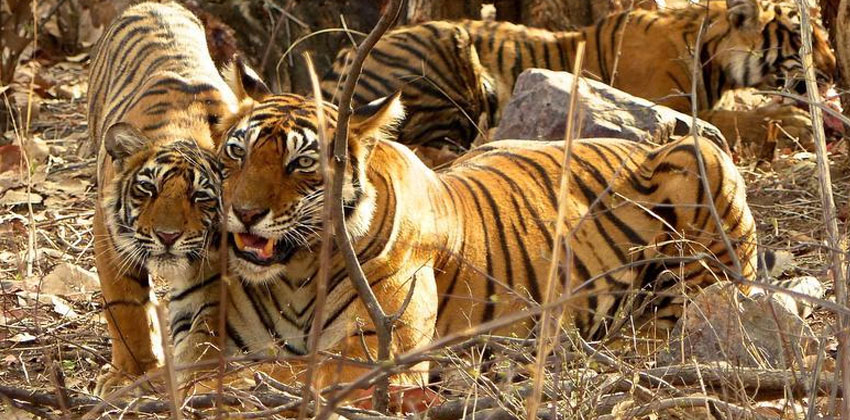From UPSC perspective, the following things are important :
Prelims level: Corbett Tiger Reserve (CTR)
Mains level: Complexity of human-wildlife conflicts

Central Idea:
The article highlights the success of Corbett Tiger Reserve (CTR) in India in managing and conserving its tiger population, emphasizing the importance of a balanced approach involving wildlife protection, community engagement, and ecological sustainability.
Key Highlights:
- CTR, spanning 1288.31 sq.km, has shown significant progress in tiger conservation, recording the highest density of wild tigers globally, from 231 to 260 in four years.
- The richly-forested, highly-biodiverse landscape attracts various enthusiasts and researchers.
- The article acknowledges the unsung heroes among the forest staff and local communities who contribute to the reserve’s ecosystem.
- Grassland and water management practices, strategic wildlife corridors, and addressing human-wildlife conflicts are vital aspects of CTR’s holistic approach.
Key Challenges:
- Human-wildlife conflicts, particularly with tigers and elephants, pose a formidable challenge.
- Ensuring the safety and security of the forest staff, who face risks while patrolling the reserve.
- Balancing the economic dependence of local communities on tiger-related tourism with the risks posed by wild animals.
Key Terms:
- Tiger Conservation Plan
- Core and buffer zones
- Biodiversity
- Grassland management
- Wildlife corridors
- Human-wildlife conflict
- Eco Development Committees (EDCs)
Key Phrases:
- “An unforgettable sight: the dread and danger lurking in the treacherous gaze of a stalking tiger.”
- “A delicate balance of forest flora and fauna is crucial for a healthy forest ecology.”
- “The rising incidence of human-elephant and tiger-human conflict poses a formidable challenge.”
- “Living with Tigers initiative aims at creating awareness and behavioral changes among local communities.”
Key Quotes:
- “A glimpse of the peerless king of the jungle in all his majesty is truly captivating.”
- “The only way ahead is by enjoining forest conservation upon all local stakeholders.”
- “The revival of the tiger since 1973 has meant a cultural renaissance and revival of our conservation ethics and values.”
Key Examples and References:
- The success of the beehive-fencing project to guard crops against wild elephants.
- The “Living with Tigers” initiative promoting awareness and behavioral changes among school children and villagers.
- The economic dependence of Ramnagar district on tiger-related tourism.
Key Facts:
- CTR covers 1288.31 sq.km and recorded 260 tigers in 2022.
- 27 different kinds of grasslands are present at CTR.
- The beehive-fencing project resulted in the creation of “Corbee Honey,” managed by local Eco Development Committees.
Critical Analysis:
The article acknowledges the complexity of human-wildlife conflicts as “wicked problems,” requiring unique solutions. It emphasizes the need for a collaborative, engaging, and socio-culturally-sensitive approach in addressing conservation challenges.
Way Forward:
- Continue efforts to balance economic benefits of tiger-related tourism with wildlife conservation.
- Scale up successful initiatives like the beehive-fencing project and “Living with Tigers” awareness program.
- Strengthen community engagement for long-term conservation efforts.
- Promote sustainable practices for wildlife protection, grassland management, and water conservation.
In essence, the article underscores the success of CTR in tiger conservation and the imperative of a comprehensive approach involving ecological sustainability, community engagement, and innovative solutions to address ongoing challenges.
Get an IAS/IPS ranker as your 1: 1 personal mentor for UPSC 2024
